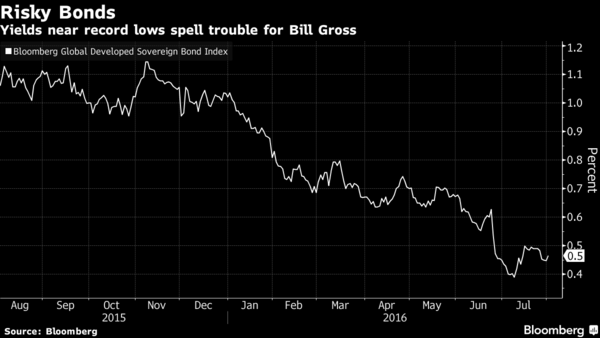Generational Dynamics
John J. Xenakis
Negative interest rates creating increased anxiety
If you pay attention to the Pollyannaish mainstream financial media, then you constantly get the picture that the economy is wonderful, and investments will only keep growing. For example, even when the financial crisis occurred in 2007-2010, and millions of people lost their jobs, went bankrupt and lost their homes, the message was always the same that all losses were in the past.
What's surprising these days is that the mainstream financial media are increasingly airing opinions that something is seriously wrong, and that there is a possible financial crisis in the offing. That has been particularly true since the end of 2015, when global sovereign bond yields started dropping like a stone.Translation:
Every country funds its treasury in several ways, and one way is to borrow money from investors by issuing "sovereign bonds." In "normal" times, investors can typically earn 2-10% interest (yield) per year on these bonds, depending on the country and the length of time before the bond will be redeemed. These sovereign bonds are considered to be the gold standard of risk-free investments, since it's believed and expected that every country will honor its obligations and redeem the bonds when they expire, paying their face value, plus the money earned as interest. However, with the recent arrival of negative yields, the country will pay the investor LESS money than the invested in the first place. So, for example, you pay $1,000 for one of these bonds that expires in two years, and two years later the country redeems it for just $990, and you've paid $10 in negative yield.

The chart above shows that sovereign bond yields have been crashing since November of last year. This is becoming increasingly alarming to many investors.
Sovereign bonds are supposed to be the safest investments in the world, but according to Bill Gross, one of the best known investors in the world, sovereign bonds are now too risky:
This was supported by a release from Fitch Ratings:
Most people look at the stock market, and think that everything is rosy, but there's a lot going on that isn't reflected in the stock market. In 2007, it was the collapse of the real estate bubble and, more importantly, the disastrous collapse of collateralized debt obligations (CDOs) backed by subprime mortgages. The disaster had already occurred before the stock market started falling.
Bloomberg columnist Lisa Abramowicz on TV on Wednesday commented on the warnings from Bill Gross and Fitch (my transcription):
As I've been writing for years, inflation or hyperinflation is not going to happen because the velocity of money keeps plummeting.
DYI Quick Comment: Deflationary collapse caused by exponential growth in corporate/private debt that reaches peak debt. The bubble bursts causing massive unemployment, velocity of money goes negative, corporate bankruptcies including major banks along with our citizens who are deeply in debt. The Federal Reserve will make direct money printing payments - picking up the shortfall in tax receipts - Social Security Administration, Health Care Financing Administration(Medicare - Medicaid) and SNAP(food stamps). In other words - HELICOPTER MONEY - to stop potential food riots especially in the inner cities and push the velocity back into positive territory.
2023 Boomer's in a statistically significant basis will exit the work force but will continue to consume(at a lesser rate) causing a decade long labor shortage. The 2020's will be known as the roaring 20's marked by high inflation caused by a labor shortage(plus money printing) and high taxes supporting ageing Boomer's.
Deflationary bust then inflation peaking around 20% to 25% as Boomer's pass on, again in statistical significant numbers in the 2030's placing the economy and most importantly social programs back into reasonable balance.
Back to Generational Dynamics
( "11-Mar-16 World View -- In desperation move, European Central Bank further lowers negative interest rates")
According to Abramowitz's contacts, the only thing that can stop the current plunge in bond yields is for some country to decide not to pay back their debt -- essentially to declare sovereign bankruptcy.
In other words, there's a major financial crisis coming no matter what.
"Sovereign bond yields at record lows aren’t worth the risk and are therefore not top of my shopping list right now; it’s too risky. Low yields mean bonds are especially vulnerable because a small increase can bring a large decline in price."
"This year's dramatic fall in yields on bonds issued by investment grade sovereigns has again raised the risk that a sudden interest rate rise could impose large market losses on fixed-income investors around the world, Fitch Ratings says. A hypothetical rapid reversion of rates to 2011 levels for $37.7 trillion worth of investment-grade sovereign bonds could drive market losses of as much as $3.8 trillion, according to our analysis."
"There's a high level of concern about how sustainable all of this is - when profits are declining, when you have growth slowing, when you have stimulus efforts that are not working and that are running out of steam -- how long can this last? But at the same time, it's very hard to see what could reverse it. The only thing that people possibly can point to is inflation, or if some country decides not to pay back their debt, or just forgive it, or come up with some kind of engineering that creates a technical problem."
DYI
No comments:
Post a Comment